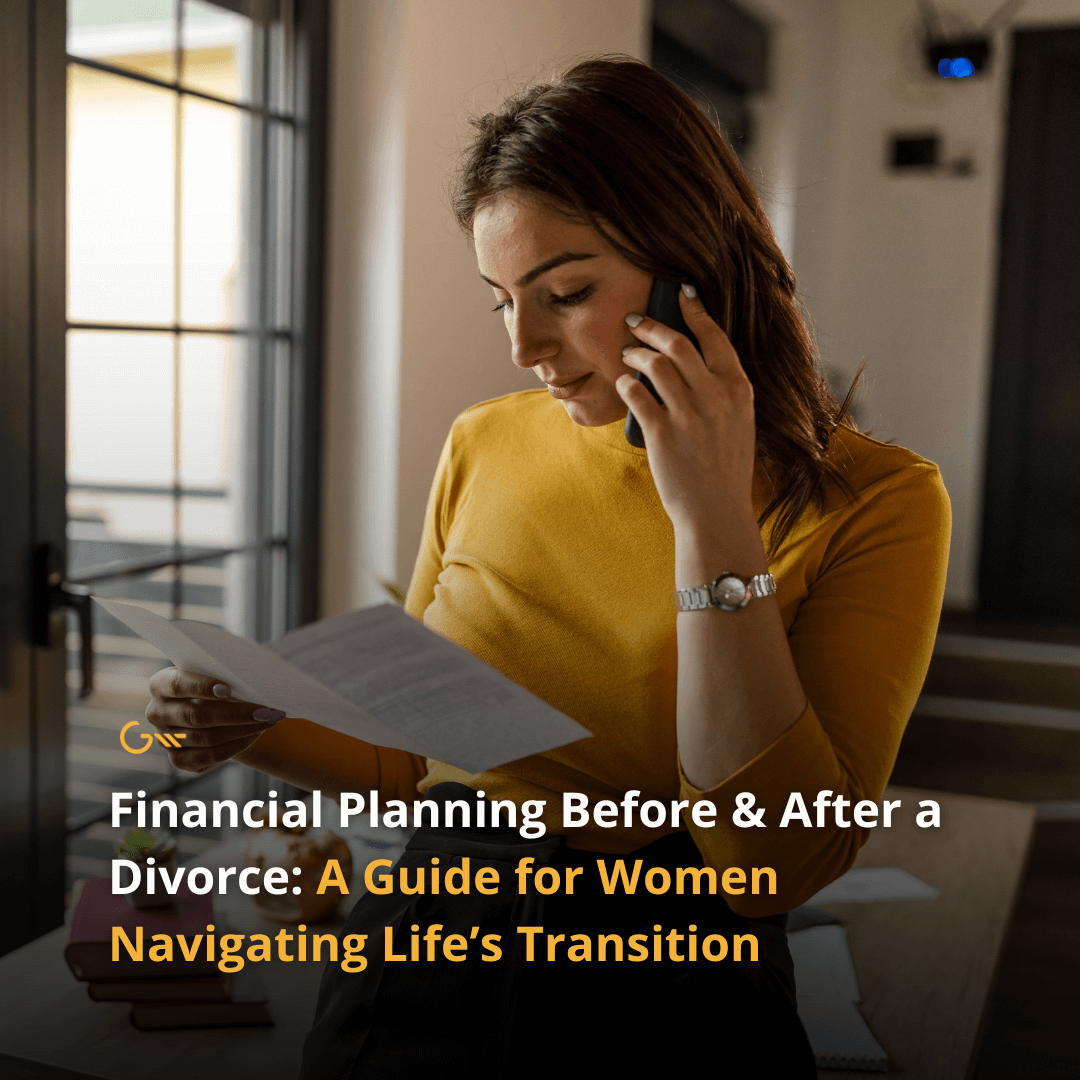Divorce is one of life’s most emotionally charged and financially complex transitions. Whether you are just beginning to consider it, actively going through the process, or finding your footing after it’s finalized, your financial life will inevitably change. For many women—whether a successful professional or a full-time caregiver to children—this can feel overwhelming, isolating, and uncertain.
At Gatewood Wealth Solutions, we recognize that divorce is not just a financial event—it’s an emotional journey filled with grief, fear, uncertainty, and sometimes betrayal. It affects more than just the couple—it ripples into relationships with children, in-laws, mutual friends, and shared professionals who may now be forced to choose sides.
Trust can be deeply shaken. That’s why our approach is grounded in empathy, discretion, and partnership. We walk with our clients through every stage—supporting them not just as financial advisors, but as steady, compassionate allies in a time of profound change.
This guide outlines the key considerations you need to think through—and the actions you should take—as you navigate this pivotal chapter.
When You’re Considering a Divorce
Before any paperwork is filed, it’s essential to take stock of your situation:
- Understand your financial position: Begin gathering all relevant documents—tax returns, bank and investment statements, insurance policies, loan documents, retirement accounts, and household expenses.
- Assess your lifestyle and spending: What does it cost to live your current life? What expenses may remain or change post-divorce?
- Consider future housing and income needs: Will you stay in the home? Will you need to re-enter the workforce?
- Meet with a financial advisor and attorney confidentially: Even if you aren’t sure you’ll move forward, early professional advice can help you understand your rights, risks, and options.
This stage is about preparation. Quietly gathering information and creating a plan helps protect your interests and gives you space to process what’s ahead emotionally.
Types of Divorces and Their Implications
Understanding the process can help you choose the right path:
- Mediated Divorce: A neutral third-party mediator helps spouses negotiate terms. Often lower in cost and less adversarial.
- Collaborative Divorce: Each spouse has their own attorney, but all commit to resolving without litigation. Additional experts, like financial advisors or therapists, may be involved.
- Litigated Divorce: If cooperation breaks down, the case proceeds to court. This is often the most contentious and expensive route.
The choice impacts your financial, emotional, and relational outcomes. Working with a financial advisor early can help you evaluate settlement options from a long-term planning lens and ensure you’re emotionally supported throughout the process.
Financial, Legal & Emotional Challenges for Women
Whether you’re a professional earning a significant income or a stay-at-home parent managing the household, divorce introduces several issues:
For Working Professionals:
- Dividing complex assets like equity compensation, business interests, and retirement plans
- Adjusting to new tax liabilities and loss of household income
- Protecting future earnings from excessive support obligations
For Stay-at-Home Mothers:
- Understanding entitlements to spousal or child support
- Re-entering the workforce or seeking training
- Securing long-term financial independence post-divorce
For All Women:
- Creating a new personal budget and financial plan
- Updating wills, trusts, beneficiary designations, and account titling
- Managing emotional trauma, decision fatigue, and shifts in family and social circles
- Navigating loss of shared friendships and community
We understand that many women feel lost in this transition. Trust in others—even professionals—can feel fragile. That’s why working with a firm like Gatewood, where we prioritize empathy, clarity, and transparency, can be a stabilizing force. Our goal is to rebuild your sense of control and confidence in your future.
A financial advisor can act as a steady hand through these transitions, helping ensure nothing falls through the cracks.
The Role of the Financial Advisor in a Divorce
A qualified financial advisor does more than analyze numbers—they provide clarity, structure, and emotional steadiness. They:
- Create financial models to evaluate settlement options
- Project cash flow and retirement viability post-divorce
- Inventory and organize assets and liabilities
- Assist in updating legal documents and insurance policies
- Coordinate with your attorney, CPA, and other relevant professional advisors
- Provide clarity when emotions are high and decisions feel overwhelming
At Gatewood, we are skilled at guiding clients through emotionally sensitive transitions with the care and confidentiality they deserve.
We build comprehensive plans tailored to your new life—empowering you to move forward with confidence.
What Documents Should You Have
- Tax returns (3 years)
- Bank, investment, and retirement account statements
- Pay stubs and income documentation
- Mortgage and debt documents
- Insurance policies (health, life, disability)
- Prenuptial or postnuptial agreements
- Estate planning documents
These help define marital vs. separate property and inform negotiation strategy. Having them prepared gives you a stronger voice in conversations that may feel emotionally loaded.
Evaluating Employee Benefits
Benefits can be an overlooked asset. Make sure to:
- Review health insurance options (COBRA, marketplace, employer coverage)
- Assess pensions, 401(k)’s, RSUs, or stock options
- Understand dependent care benefits or FSA’s
- Clarify ownership or division of group life insurance policies
If you’re covered under your spouse’s benefits, have a plan for transitioning off.
Practical Steps to Take During a Divorce
- Assemble a professional team: attorney, financial advisor, therapist
- Open individual bank and credit accounts
- Track your income and spending
- Freeze or monitor credit
- Establish a post-divorce budget
- Update passwords and secure personal information
- Review estate plan and insurance needs
We guide clients through each of these so they feel supported and informed—not alone.
Two Examples of Planning in Action
Case Study 1: Sarah, Corporate Executive
Sarah was a high-earning executive who handled investments but never paid much attention to cash flow. During her divorce, we:
- Modeled child support and alimony scenarios
- Analyzed division of deferred compensation and RSU’s
- Built a post-divorce financial plan that ensured she could maintain her lifestyle and retire on time
- Worked with her attorney to structure settlement payments in a tax-efficient way
Sarah walked away empowered, informed, and with a clear roadmap for her financial future.
Case Study 2: Emily, Stay-at-Home Mom
Emily had been out of the workforce for 15 years, raising her three children. We:
- Helped her inventory marital assets
- Coordinated with her attorney to secure support and long-term housing
- Built a cash flow plan with gradual return-to-work assumptions
- Worked with an estate attorney to update her will and establish a trust for the children
Emily gained financial confidence and clarity, with a plan that gave her options.
A Final Word and Where You Can Turn
Divorce doesn’t have to mean financial confusion or fear. With the right team and the right plan, you can take control of your future, protect what matters, and make empowered decisions.
At Gatewood Wealth Solutions, we specialize in helping women plan through and beyond divorce. Whether you’re just starting to consider it or have finalized it and need help rebuilding, we’re here for you.
Let’s talk. Your next chapter deserves a solid plan.
Important Disclosures
This material was created for educational and informational purposes only and is not intended as tax, legal or investment advice. For a comprehensive review of your personal situation, always consult with a tax or legal advisor. Neither LPL Financial nor any of its representatives may give legal or tax advice.
This is a hypothetical situation based on real life examples. Names and circumstances have been changed. The opinions voiced in this material are for general information only and are not intended to provide specific advice or recommendations for any individual. To determine which investments or strategies may be appropriate for you, consult your advisor prior to investing.





